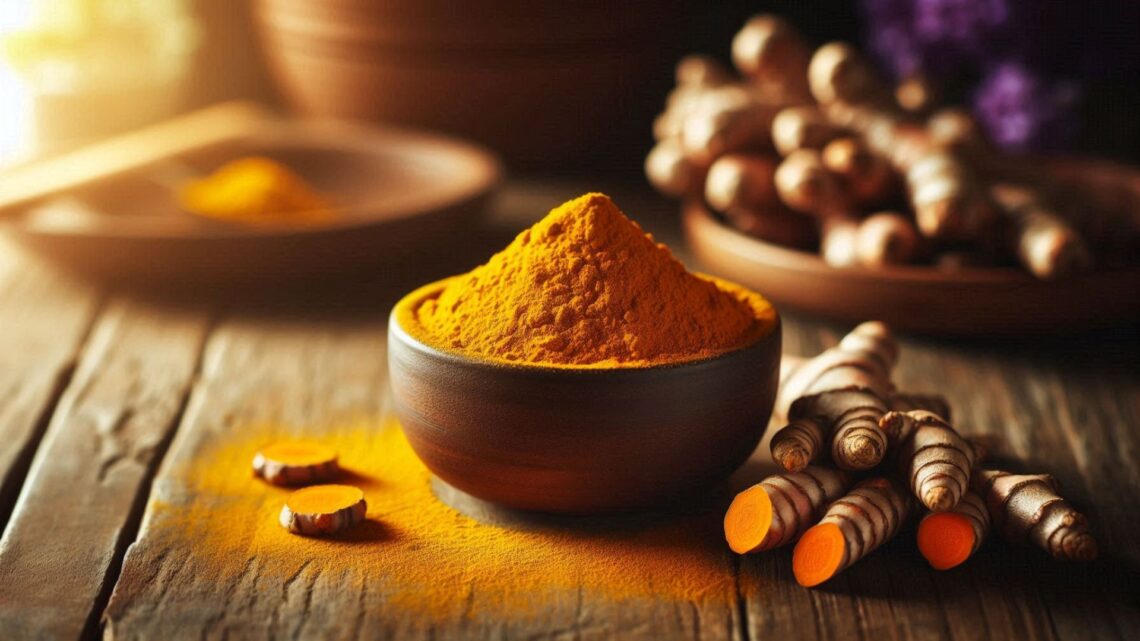Turmeric, the golden-orange spice that has been used for centuries in cooking and traditional medicine, is gaining attention worldwide as a natural remedy for pain relief. Beyond giving curries their vibrant hue, turmeric offers powerful anti-inflammatory and antioxidant properties that may support joint health, ease muscle soreness, and even benefit overall wellness.
In this article, we’ll explore how turmeric works as a natural pain reliever, what science says about its effectiveness, the potential risks of supplements, and how you can easily add it to your daily diet.
What’s Turmeric Good For?
The active compound in turmeric is curcumin, which acts as a natural anti-inflammatory and antioxidant. These properties are what make turmeric such a valuable tool in managing pain and supporting overall health.

- Arthritis and joint pain
- Colitis and digestive inflammation
- Seasonal allergies
- Heart disease and diabetes
- Certain types of cancer
According to Mary-Eve Brown, a clinical dietitian at Johns Hopkins Medicine, colorful, plant-based foods like turmeric help protect the body from environmental damage and inflammation. Chronic inflammation is linked to conditions such as:
👉 In short, adding turmeric to your diet could support a healthier, more resilient body.
“Curcumin does a lot of things in the body—some we still don’t fully understand,” says Brown. “But like other colorful, plant-based foods, turmeric is full of nutrients that may protect your body from damage caused by things like pollution or too much sun.”
Eating more plant-based foods like turmeric has been linked to a lower risk of conditions like cancer and heart disease. Brown adds, “If you’re dealing with inflammation—like arthritis, joint pain, colitis, or even allergies—adding turmeric to your meals could really help.”

Also Read: Can Dietary Changes Serve as Natural Pain Remedies?
What Does the Science Say?
Turmeric has been widely studied, particularly for its effects on joint pain and arthritis.

- Osteoarthritis relief: Clinical studies suggest that turmeric can reduce joint pain and improve mobility in people with osteoarthritis.
- Mood and mental health: Early research shows potential benefits in easing depression and anxiety.
- Neuroprotection: Some studies indicate turmeric may help reduce risk factors linked to dementia and cognitive decline.
Other potential areas of benefit include:
- Lowering cholesterol
- Supporting kidney health
- Easing muscle soreness after workouts
- Promoting eye health
While results are promising, scientists emphasize that more high-quality studies are needed to confirm these effects.
(For further reading, see National Center for Complementary and Integrative Health).
Here are some other potential benefits researchers are exploring:
- Lowering inflammation
- Helping with arthritis
- Supporting eye health
- Easing metabolic issues
- Managing cholesterol
- Reducing anxiety
- Relieving sore muscles after exercise
- Supporting kidney health
Should You Take Turmeric Supplements?
While turmeric supplements are popular, experts urge caution.

- Bioavailability issues: Curcumin is not easily absorbed by the body. Pairing it with black pepper (piperine) can enhance absorption by up to 2,000%.
- Kidney stones: High doses of curcumin from supplements may increase kidney stone risk.
- Better from food: Whole foods (like turmeric root or powder in cooking) provide a safer, balanced way to enjoy its benefits.
👉 Expert tip: Use turmeric in soups, stews, teas, or smoothies instead of relying solely on pills.
For example, turmeric supplements can increase the risk of kidney stones, especially if you’re prone to them. That’s because they contain a lot more curcumin than you’d ever get just from food or tea.
Another issue? Your body doesn’t absorb curcumin easily. It breaks it down fast during digestion. But here’s a trick: pair it with black pepper. A substance in pepper called piperine can boost curcumin absorption by up to 2,000%.
“It’s better to get turmeric from whole foods instead of supplements,” says Brown.
Turmeric Supplements Can Interact with Medications
High-dose turmeric supplements may interact with certain medications. Always consult your healthcare provider before starting supplements, especially if you take:

- Pain relievers (aspirin, ibuprofen) – may alter effectiveness
- Chemotherapy drugs (like doxorubicin, cyclophosphamide) – potential interference
- Blood thinners (warfarin, clopidogrel) – increased bleeding risk
- Immunosuppressants (tacrolimus) – higher risk of side effects
Are There Any Side Effects?
For most people, turmeric in food or tea is safe and well-tolerated. But possible issues include:
- Mild allergies: skin rash, hives, or stomach upset
- Excess supplementation: nausea, diarrhea, dizziness
Bottom line: turmeric is safe when enjoyed as part of your diet but should be used cautiously in concentrated supplement form.

Also Read: How effective are essential oils in managing Chronic Pain?
How to Enjoy Turmeric in Everyday Life
Turmeric is versatile, flavorful, and easy to use in:

- Curries and stews
- Rice or quinoa dishes
- Smoothies and lattes (“golden milk”)
- Marinades for chicken, fish, or tofu
- Homemade salad dressings
💡 Pro Tip: Buy fresh turmeric root from your local market. Freeze it for up to 6 months and grate it into dishes as needed.
⚠️ Be mindful: turmeric stains clothing and countertops. Clean spills promptly with gentle cleaners or diluted bleach.ful: turmeric stains clothing and countertops. Clean spills promptly with gentle cleaners or diluted bleach.an stain your clothes and countertops. If it does, gentle cleaners or bleach can usually take care of it.
Make Turmeric Tea
A simple way to enjoy turmeric’s benefits is by brewing a warm, soothing tea.
Ingredients:
- 2 tablespoons c2 tablespoons fresh chopped turmeric root (or 2 teaspoons turmeric powder)
- 1–2 cups water
- Optional: honey, lemon, or a pinch of black pepper.
Directions:
- Bring water and turmeric to a boil.
- Simmer for 5 minutes.
- Strain and enjoy warm or chilled.
- This calming drink can be a daily ritual for inflammation support and relaxation.
You can add honey or lemon for a little flavor boost.

Also Read: What are Some DIY Home Remedies for Migraine Relief?
Try This Turmeric Recipe: Curried Pumpkin & Butternut Squash Soup (Vegan & Creamy)

You’ll Need:
- Olive oil
- 1 lb pumpkin (peeled & diced)
- 1 lb butternut squash (peeled & diced)
- 2 shallots, diced
- 2–3 tbsp Thai red curry paste
- 2 tbsp fresh grated turmeric root (or 2 tsp powder)
- 4 cups vegetable broth
- 1 can coconut milk (unsweetened)
- Salt & pepper to taste
Steps:
- Roast pumpkin and squash at 400°F for 10–15 minutes until tender.
- In a pot, sauté shallots, curry paste, and turmeric in olive oil for 8–10 minutes.
- Add roasted veggies and broth. Simmer 20 minutes.
- Stir in coconut milk, season to taste, and simmer lightly.
- Blend until smooth.
- Serve with warm bread or rice for a cozy, anti-inflammatory meal.
Final Thoughts
Turmeric isn’t just a kitchen spice—it’s a natural remedy with centuries of use and growing scientific support. While supplements can pose risks, incorporating turmeric into your diet through food, tea, or recipes is a safe and effective way to harness its benefits.
If you’re dealing with inflammation, arthritis, or chronic pain, adding turmeric may be worth trying alongside conventional treatments.
👉 Takeaway: Think of turmeric not as a miracle cure, but as a supportive tool for better health.
FAQs About Turmeric and Pain Relief
Q1. How much turmeric should I take daily?
Most experts recommend 500–2,000 mg of turmeric per day from food. Supplements should only be taken under medical guidance.
Q2. Can turmeric replace pain medications?
No. Turmeric can help manage mild inflammation and discomfort but should not replace prescribed medications.
Q3. Is turmeric safe during pregnancy?
Small amounts in food are generally safe, but high-dose supplements are not recommended during pregnancy without medical approval.
Q4. Does turmeric really help with arthritis?
Yes, studies show turmeric can ease joint stiffness and swelling in osteoarthritis patients, though results vary.
Q5. Can I mix turmeric with other natural remedies?
Yes. Many people combine turmeric with ginger, cinnamon, or green tea for synergistic benefits.






